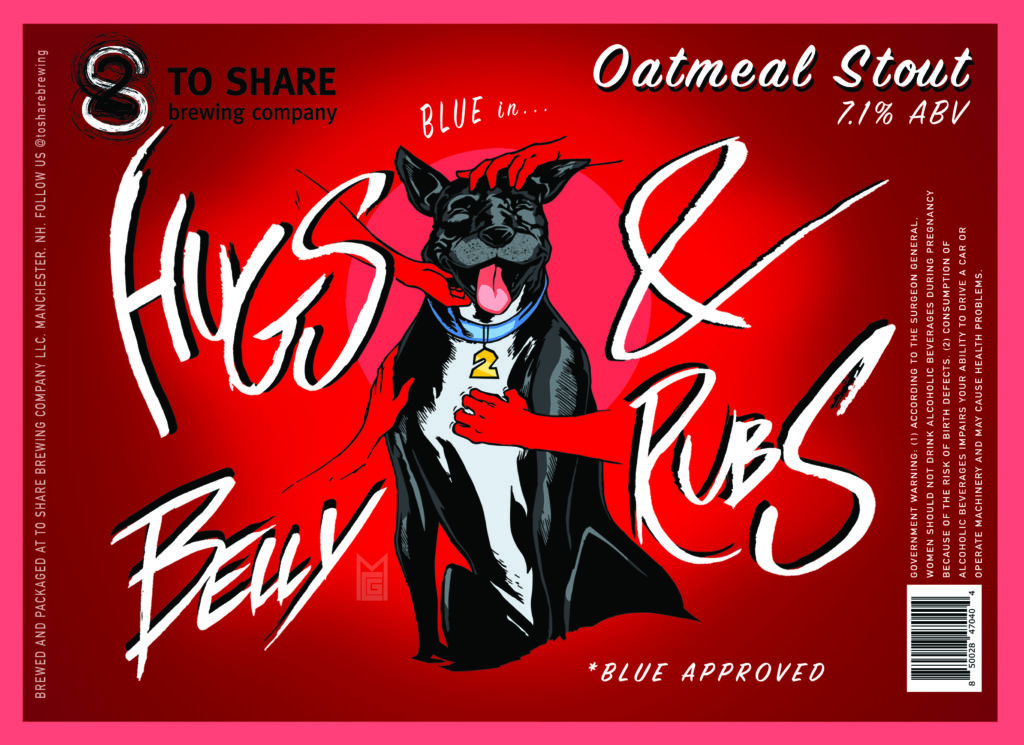Buzz Kill: NH Liquor Commission Rejecting Local Beer Labels Over Art

To Share Brewery in Manchester is known for tasty beer served in a fun environment. Its Hugs & Belly Rubs Oatmeal Stout features a drawing of a cartoon dog with a big grin getting plenty of love.
But the New Hampshire Liquor Commission (NHLC) says you will never see it, because an artistic rendition of a dog might make the 7.1 percent ABV stout too appealing to children.
“I’ve been doing this for five years, and this is the first time we’ve been denied,” said Aaron Share, one of the owners of the To Share Brewery in Manchester.
 NHJournal has learned the NHLC is implementing strict new rules on what beer makers may put on their labels, and they are doing it based on a questionable interpretation of the agency’s current power, along with a proposed law expanding that power but hasn’t been passed by the legislature.
NHJournal has learned the NHLC is implementing strict new rules on what beer makers may put on their labels, and they are doing it based on a questionable interpretation of the agency’s current power, along with a proposed law expanding that power but hasn’t been passed by the legislature.
In fact, it hasn’t even been written.
Information obtained by NHJournal indicates the Liquor Commission has been cracking down on brewers in part using the state law that says it has the power to ban advertising with “any subject matter or illustrations that the commission determines is reasonably likely to induce minors to drink.”
Critics say the rejected art, like Kettlehead Brewing Company’s “Buggin’,” doesn’t come close to meeting that definition.
And so, to reject labels like Kettehead’s “Swoll” brew, the NHLC is also relying on its understanding of changes to the law that have been proposed by progressive state Sen. David Watters (D-Dover). But those changes have yet to be drafted, much less enacted.
Many of the brewers contacted by NHJournal were hesitant to talk about the issue, not wanting to get on the wrong side of a state bureaucracy with the power to kill their business.
CJ White with the New Hampshire Brewers Association declined to comment, saying she hoped to get more information from the commission in the coming days.
Share is mystified by the rejection since the same “smiling dog” label has won approval from the state for years. An email to Share from Liquor Examiner Angel Harris cited pending changes as the reason for the label’s recent rejection.
“In consideration of current legislation and anticipated legislation change on restricting product labels, the product label you have recently requested is not approved,” Harris wrote.
The Hugs and Belly Rubs product was changed this year from an American Stout beer to an Oatmeal Stout, and the only change to the label for this year’s brew is swapping out the word “American” and replacing it with “Oatmeal.”
Other brewers told NHJournal they are having the same experience with previously approved illustrated labels. Some are even getting labels approved by the federal Alcohol Tobacco and Tax Bureau, only to have those same labels rejected by the Liquor Commission.
When reached by NHJournal, Harris declined to comment, referring the matter to Lt. Matthew Culver. Culver also declined to comment and referred the matter to the commission’s public relations firm, Montagne Powers.
EJ Powers, with Montagne Powers, did not acknowledge the commission had changed the review process, or address the apparent use of pending rule changes, as cited by Harris.
“The Division takes its process seriously and closely reviews approximately 5,400 labels each year – approving 96 percent of them,” Powers said via email.
Share and other brewers said they had not been able to get answers when they reached out to the commission. Instead, they have all been referred to as Montagne Powers as well.
Some brewers suspect the problem is Watters’ ongoing war against alcohol advertising that he believes targets children. Watters confirmed to NHJournal that his efforts may lead to changes that have yet to be enacted.
“Some decisions might have been made prematurely,” Watters said.
Watters has filed an LSR — a notice he plans to file a law — that would tighten alcohol advertising standards and make the appeals process more transparent. But, Watters told NHJournal, if the NHLCX is making decisions costing small businesses tens of thousands of dollars, they are doing it based on an LSR that doesn’t even have a complete draft yet.
Asked if he supports the treatment Granite State brewers are receiving, apparently as a result of his political influence, Watters deflected.
“I can’t speak to the way the commission makes decisions,” Watters said.
Watters said the commission will issue a new communication to the beer industry shortly to clarify the guidelines. He wants the state to adhere to common sense rules about labels and advertising. Those rules should allow for illustrated labels, he said.
“I don’t think it’s the case you can’t have a dog on a beer can. Maybe Scooby Doo isn’t so good,” Watters said.
Share is fighting his label’s rejection, going to the Liquor Commission to request a review and possibly an appeal. His message for other brewers in the Live Free or Die State: “I suggest we all fight this. That’s what we’re doing,” Share said.
But being a pragmatic businessman, Share also has a Plan B: a plain black label explaining why there is no art.




